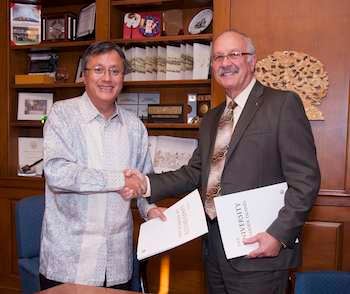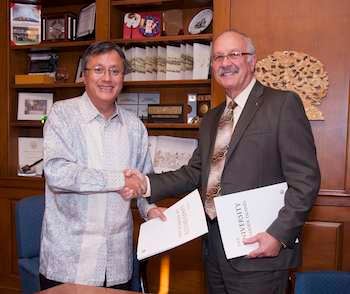 Partnership strengthens President David M. Dooley’s global vision for University
Partnership strengthens President David M. Dooley’s global vision for University
KINGSTON, R.I. – Nov. 4, 2013 – The University of Rhode Island and Indonesia have teamed up to bring government professionals from the Southeast Asian country to study fisheries management and marine-related fields on campus starting next fall.
The partnership, signed Oct. 25, is another step toward transforming the University into an international campus – a goal of URI President David M. Dooley and Provost Donald H. DeHayes. The pact is also a testament to URI’s world-class faculty in sustainable fisheries and marine affairs.
“We are thrilled that Indonesian professionals from the Ministry of Marine Affairs and Fisheries will soon be studying at URI,” says DeHayes. “Our University has one of the most innovative marine and fisheries programs in the United States, offering intensive classroom experiences and hands-on learning on Rhode Island’s thriving coastline and inland waterways. We look forward to continuing our long collaboration with Indonesia as we transform URI into a robust global learning community.”
Under the agreement, staff from the Indonesian Ministry of Marine Affairs and Fisheries will take courses on the main campus and at URI’s Graduate School of Oceanography on the Narragansett Bay campus to enrich their knowledge of marine affairs, resource economics, and the development of healthy and sustainable fishing practices. The participants will also apply what they learn to help their country craft its first fisheries management plan.
Twenty-five workers at Indonesia’s Ministry of Affairs will enroll at URI in the fall of 2014. Of those, 20 will pursue master’s degrees and five will earn doctorates. In addition to fisheries management, marine affairs, and natural resource economics, they will also study environmental science and management.
Indonesia chose URI because of its expertise in marine and fisheries management and its lively collaboration with the University, dating back to the early 1980s. URI also has a strong working relationship with alumnus Gellwynn D.H. Jusuf, director general for capture fisheries at the Indonesian Ministry of Affairs and Fisheries and an accomplished scientist and leader in his country. Jusuf obtained his master’s degree from URI in 1989 and his doctorate in 1997, both in marine resource economics.
“Jusuf’s experience at URI was memorable, and he maintained close ties to the outstanding faculty in his program,” says Nancy Stricklin, assistant to the provost for global strategies and partnerships. “When the Indonesian government initiated opportunities for professionals in the field of fisheries to pursue advanced degrees in the United States, he looked no further than his alma mater. We are honored to have this partnership with the Ministry and look forward to welcoming them to the URI community.”
The partnership has been in the works for years. Stricklin, DeHayes, Thomas Boving, a professor of hydrology, and John Kirby, dean of the College of Environment and Life Sciences, visited Indonesia last June to strengthen ties and create new opportunities for URI and Indonesia.
URI has also established partnerships with three colleges: Universitas Gadjah Mada in Yogyakarta; Bogor Agricultural University in Bogor; and Universitas Atma Jaya in Jakarta. Details are still to be worked out, but programs could include joint research projects, study abroad for faculty and students, and participation in seminars and conferences. Participants can study any academic field.
David A. Bengtson, professor and chair of the Department of Fisheries, Animal and Veterinary Science, is scheduled to visit all three Indonesian universities in November to give talks and connect with faculty and students. He says the Indonesian partnership benefits all involved.
“First, with the world’s fourth largest population and an expanding economy, Indonesia is rapidly increasing its influence in the world,” he says. “Second, with 17,000 islands, its coastal waters will be an important source of seafood from both fisheries and aquaculture, not just for Indonesians, but globally. Finally, the development of relationships between URI and Indonesian universities will expand URI’s reach in the world and further develop URI’s reputation as an important global university, not just for graduate students, but for undergraduates as well.”
With thousands of miles of coastline and expansive inland waterways, Indonesia is poised to become one of the world’s largest producers of fish and fish products. But the so-called “catch from the sea” is declining – as it is in many of the world’s waters – so Indonesians are exploring ways to cultivate their own fish and establish more sustainable fishing practices.
Indonesia’s marine life provides a livelihood for 65 million people, making the Pacific archipelago the largest “blue economy” in the world, according to the U.S. Department of State.
Climate change, unsustainable fishing practices, pollution, and poor watershed management threaten the country’s fish resources, the state department says. The URI partnership allows Indonesia to solve those problems and protect the ocean’s resources and beauty for years to come.
Indonesia is also strategically important in the world. It has one of the highest growth rates in Southeast Asia and a population roughly equivalent to the United States. It also has the largest Muslim population in the world.
In September, 16 Indonesian government officials and academics visited URI’s Coastal Resources Center for three weeks to learn more about fisheries management. The program, funded by the United States Agency for International Development, was also offered by the Fisheries Center of the College of Environment and Life Sciences.
In addition to taking classes, the participants toured Narragansett Bay and visited fishing facilities, speaking to fishermen, fish processors, and government workers. The big idea the visitors came away with is that fishermen in Indonesia need to be a part of any changes in fishing policies in the vast Arafura Sea.
Brian Crawford, interim director of the Coastal Resources Center, says the new partnership is a wonderful opportunity to continue an already strong bond with Indonesia’s Ministry of Marine Affairs and Fisheries. He lived in the country for several years and has worked closely with the Ministry since its creation a decade ago.
“The partnership will create great opportunities for Indonesian students to learn from the wealth of experience in the United States, and for our American students to learn about challenges of marine conservation and management in another part of the world,” Crawford says. “The Coastal Resources Center’s involvement is part of a long relationship with the Ministry to build its professional capacity and help it address the pressing marine conservation and fisheries resource management challenges in a region that contains the highest concentration of marine biodiversity on the planet.”
Pictured above: on left, Gellwynn H.D. Jusuf, director general for capture fisheries at the Indonesian Ministry of Affairs and Fisheries, and Donald H. DeHayes, URI’s provost and vice president for academic affairs. Photo by Michael Salerno Photography.

